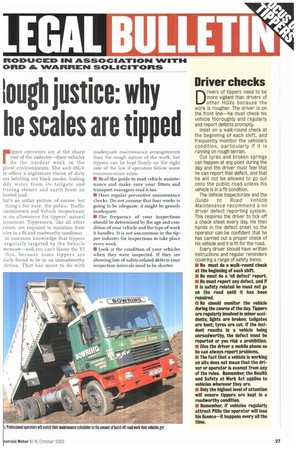Driver checks
Page 27

If you've noticed an error in this article please click here to report it so we can fix it.
Drivers of tippers need to be more vigilant than drivers of other HGVs because the work is rougher. The driver is on the front line—he must check his vehicle thoroughly and regularly and report defects promptly.
Insist on a walk-round check at the beginning of each shift, and frequently monitor the vehicle's condition, particularly if it is running on rough terrain.
Cut tyres and broken springs can happen at any point during the day and the driver must feel that he can report that defect, and that he will not be allowed to go out onto the public road unless his vehicle is in a fit condition.
The Vehicle Inspectorate and the Guide to Road Vehicle Maintenance recommend a nil driver defect reporting system. This requires the driver to tick off a check sheet every day. He then hands in the defect sheet so the operator can be confident that he has carried out a proper check of his vehicle and it is fit for the road.
Every driver should have written instructions and regular reminders covering a range of safety items:
• He must do a walk-round chock at the beginning of each shift.
• He must do a 'nil defect report.
• He must report any defect, and if It Is safety related he must not go on the road until it has been repaired.
4-.:, He should monitor the vehicle during the course of the day. Tippers are regularly Involved in minor accidents; lights are broken; tailgates are bent; tyres are cut. If the incident results in a vehicle being unroadworthy, the defect must be reported or you risk a prohibition.
Give the driver a mobile phone so he can always report problems.
w The fact that a vehicle is working on site does not mean that the driver or operator Is exempt from any of the rules. Remember the Health and Safety at Work Act applies to vehicles wherever they are.
Only the highest level of attention will ensure tippers are kept in a roadworthy condition.
. Remember, if vehicles regularly attract PG9s the operator will lose his licence—it happens every all the time.




































































































































































